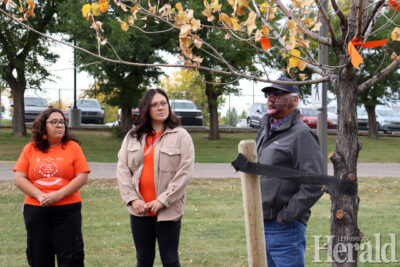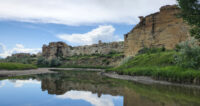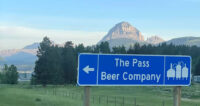Residential school horrors recalled at U of L event
By Lethbridge Herald on September 27, 2023.
 Students Aysha Partington and Cierra Ross, leads on the Roots of Growth Project, listen to Mike Bruised Head speak about the residential school experience on Wednesday at the University of Lethbridge.
Herald photo by Al Beeber
Students Aysha Partington and Cierra Ross, leads on the Roots of Growth Project, listen to Mike Bruised Head speak about the residential school experience on Wednesday at the University of Lethbridge.
Herald photo by Al BeeberAl Beeber – LETHBRIDGE HERALD – abeeber@lethbridgeherald.com
Mike Bruised Head remembers sleeping with one eye open as junior boys were led away in the dark of night by nuns to be abused by others.
Bruised Head, a fourth generation residential school survivor, wonders whether the abusers of those children were praying for forgiveness or to their God to tell them what they were doing to Indigenous children was OK.
He also questions how those who did the acts of baptizing Indigenous peoples could bless people “when you’re evil.”
Bruised Head on Wednesday afternoon spoke to a group of students at the University of Lethbridge at an event called “Roots of Growth Memorial.” It was part of a week of events and activities staged by the university to recognize Truth and Reconciliation Week.
Last year, four trees were planted across the university campus to honour the resilience and strength of Indigenous peoples and those were impacted by the residential school system.
One of those trees, a young Sergeant poplar, was the site of Bruised Head’s talk after a group walked silently to a grove of trees where the poplar stands. Along with the poplar also planted were a Lodgepole pine, golden willow and two Saskatoon berry bushes but the willow has since died. These were plants used for “time immemorial” by Indigenous peoples, Bruised Head told the assembly.
He calls the trees a lifelong dedication to residential school survivors.
Bruised Head first entered the residential school system on Sept. 7, 1964 and left on June 29, 1976. He recalled trying to join the U.S. Marines in Yakima, Washington to serve in Vietnam when he was in Grade 11 to escape the horrors of the school system but he had no identification and was sent back to Canada.
He said many students didn’t survive the school system. Some hung themselves, others drank themselves to death and “a lot of kids died of physical strangulation, not necessarily with a rope but at the mercy of somebody’s hand,” deaths which Bruised Head said still need to be investigated.
He said the abuse at schools was covered up by government and the police and those actions are still being covered up “but unmarked graves have exposed themselves.”
He recalls losing his braids when he first went to school and for being abused simply for speaking his own language.
Bruised Head said female students were subject to abuse just like males were and added he has a female cousin who to this day hates churches.
Nuns took youngsters to male missionaries to be abused, said Bruised Head, adding he won’t let the nuns off the hook for the role they played in the abuses.
Those who didn’t help with the abuse knew about it, he said.
Nuns would wake up the younger boys and take them to a door and they later would come back to their beds whimpering.
Boys would “sleep with one eye open for six years, not wanting it to be your turn that night or on the weekend,” he said
Students Cierra Ross and Aysha Partington were project leads on the Roots of Growth project which they started when they were in the First Nations Transition Program, now the Indigenous Student Success Cohort where they were given the assignment.
Before the walk, Ross told the group the residential school system is a subject that needs to be discussed not for one day, but every day.
“It’s starting to be talked about more but it’s not just one day, it’s every day. And I think it’s going to start by education, it’s going to start by getting people to read the 94 calls to action. It started in the education system, the wrong way and I think it’s our turn to bring it back to the education system and really educate” people, Ross added.
The project leads say while some want the residential school sites to be destroyed, they think it’s important to keep them because it’s part of their history.
“It gives it the realness that it actually happened and we need to acknowledge that because we can’t have reconciliation without the truth, said Ross.
And they want to plant a tree at every residential school site.
They both want everyone to read the 94 calls to action that were recommended by the Truth and Reconciliation Commission of Canada.
Secondly they want people to educate themselves and others around them.
They said Indigenousness is a Canadian identity and should be taught as such.
Thirdly, they say Indigenous awareness is an everyday thing.
“There have been seven generations of cultural genocide that needs to be addressed, that needs to be healed. This project has been a promise of trying to create a better tomorrow by being united and leaving this better than we got it, fixing our own country before helping another one,” the two said in a statement.
29-28





Out of curiousity and respecting the severity of the allegations made by Mr BruisedHead has there been ANY attempt to verify his claims as having substantive merit? Many of thse allegations are criminal in nature and pursuit of prosecution is not barred.
Genocide is a serious claim and reliance on “anomalies” and unverified accounts is dangerous and a failure to uphold academic rigour.
I dont challenge Mr BruisedHeadds veracity but wonder why some are so quick to condemn and label on evidence such as presented.